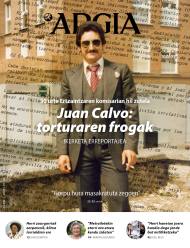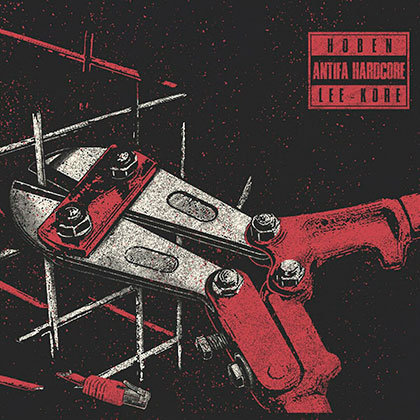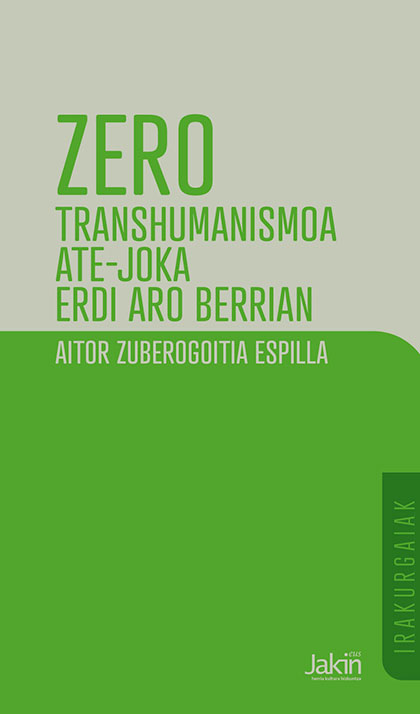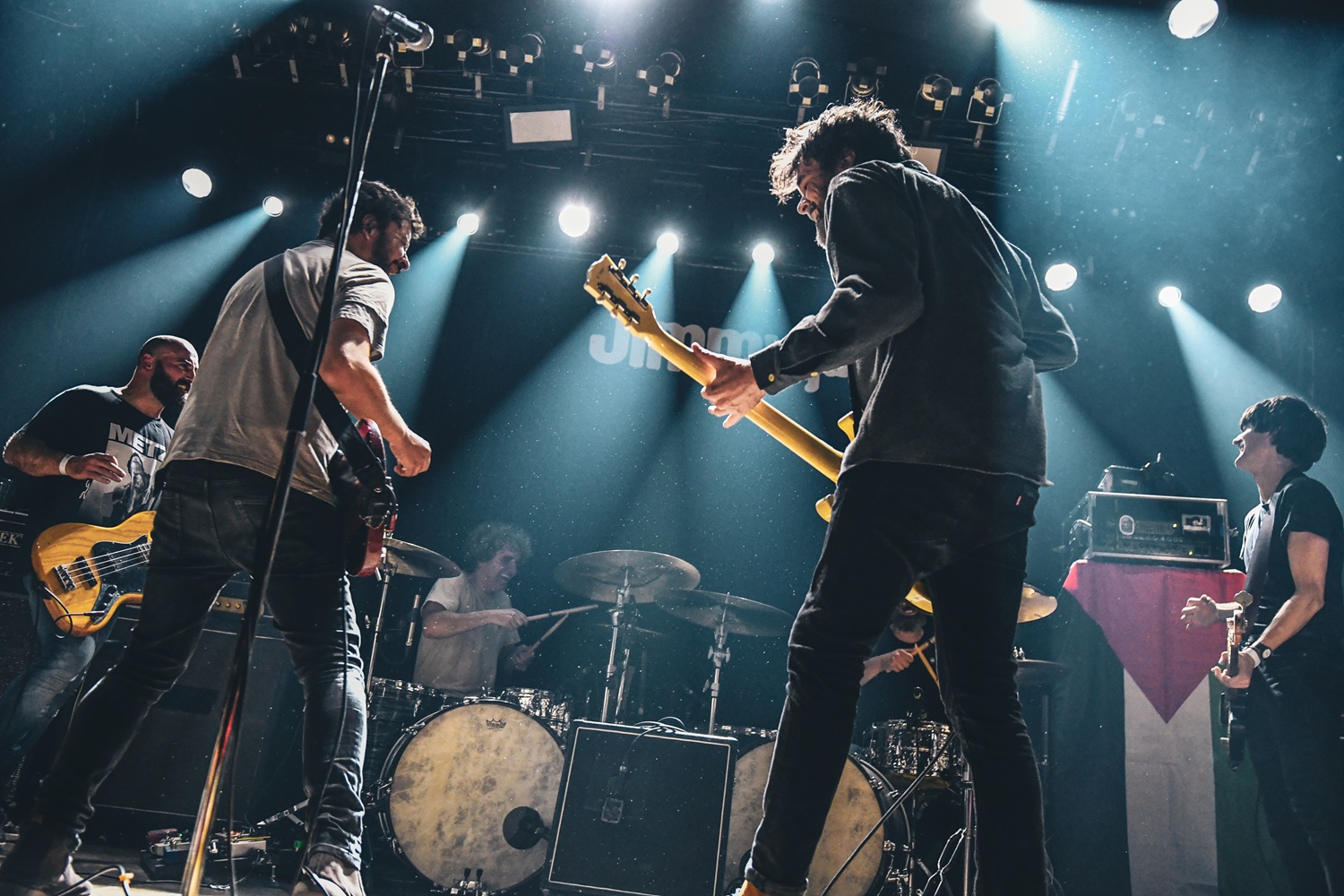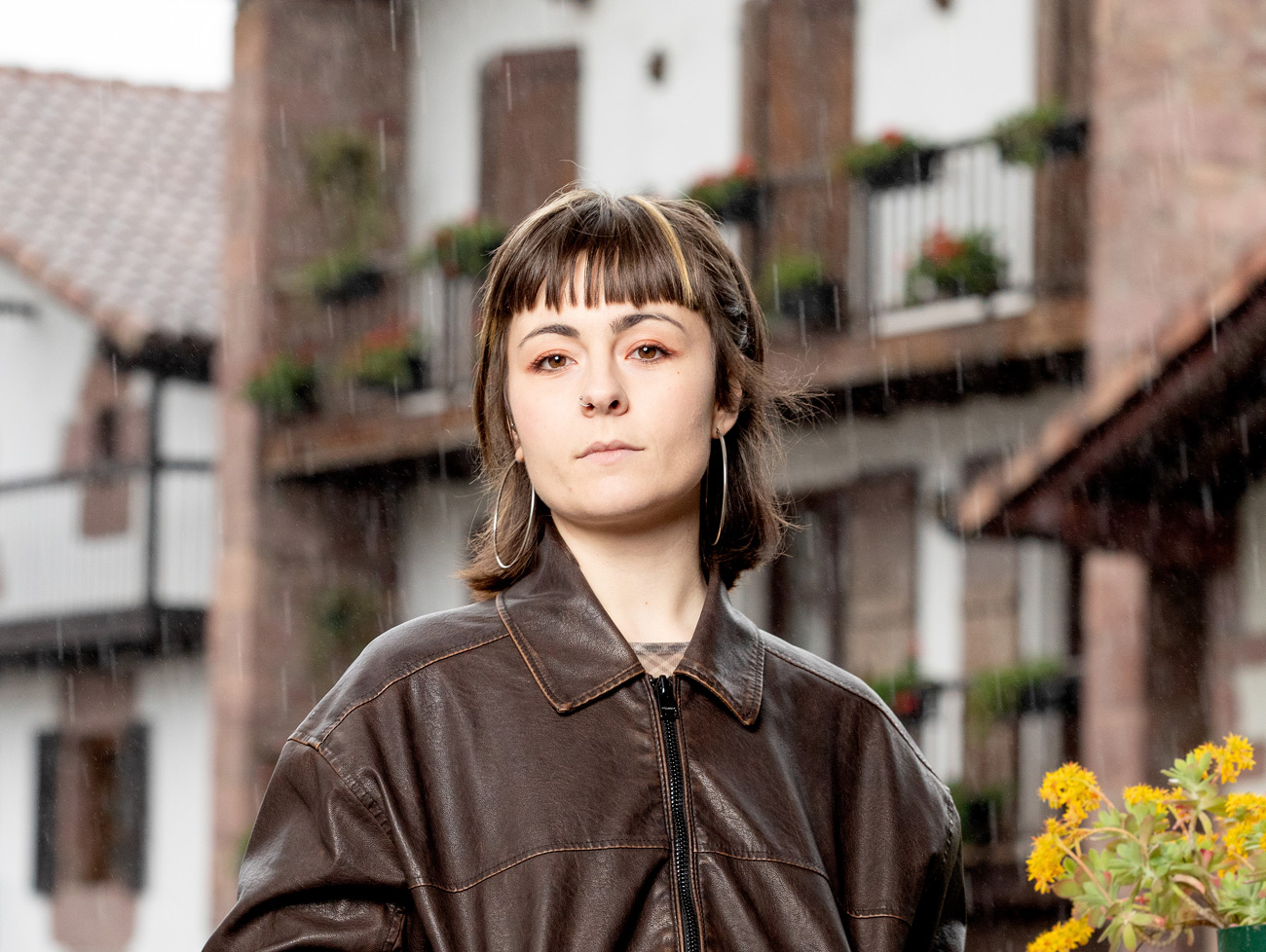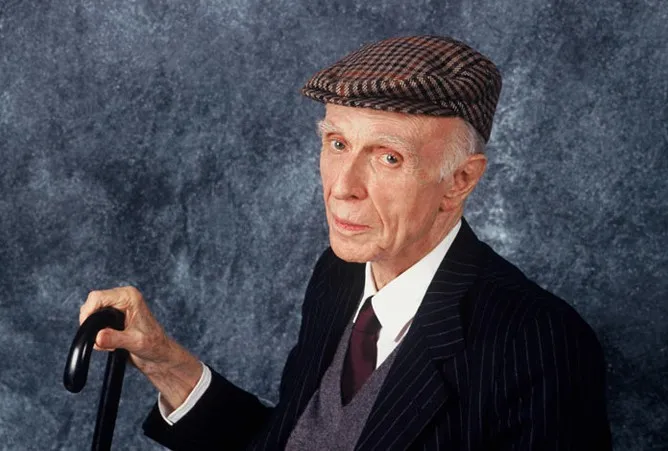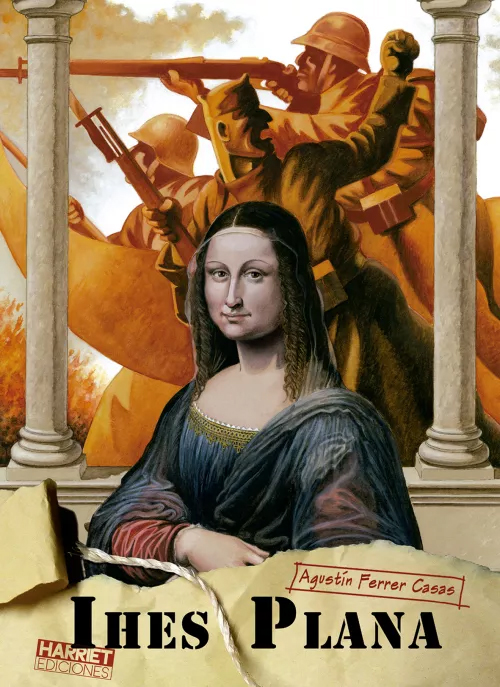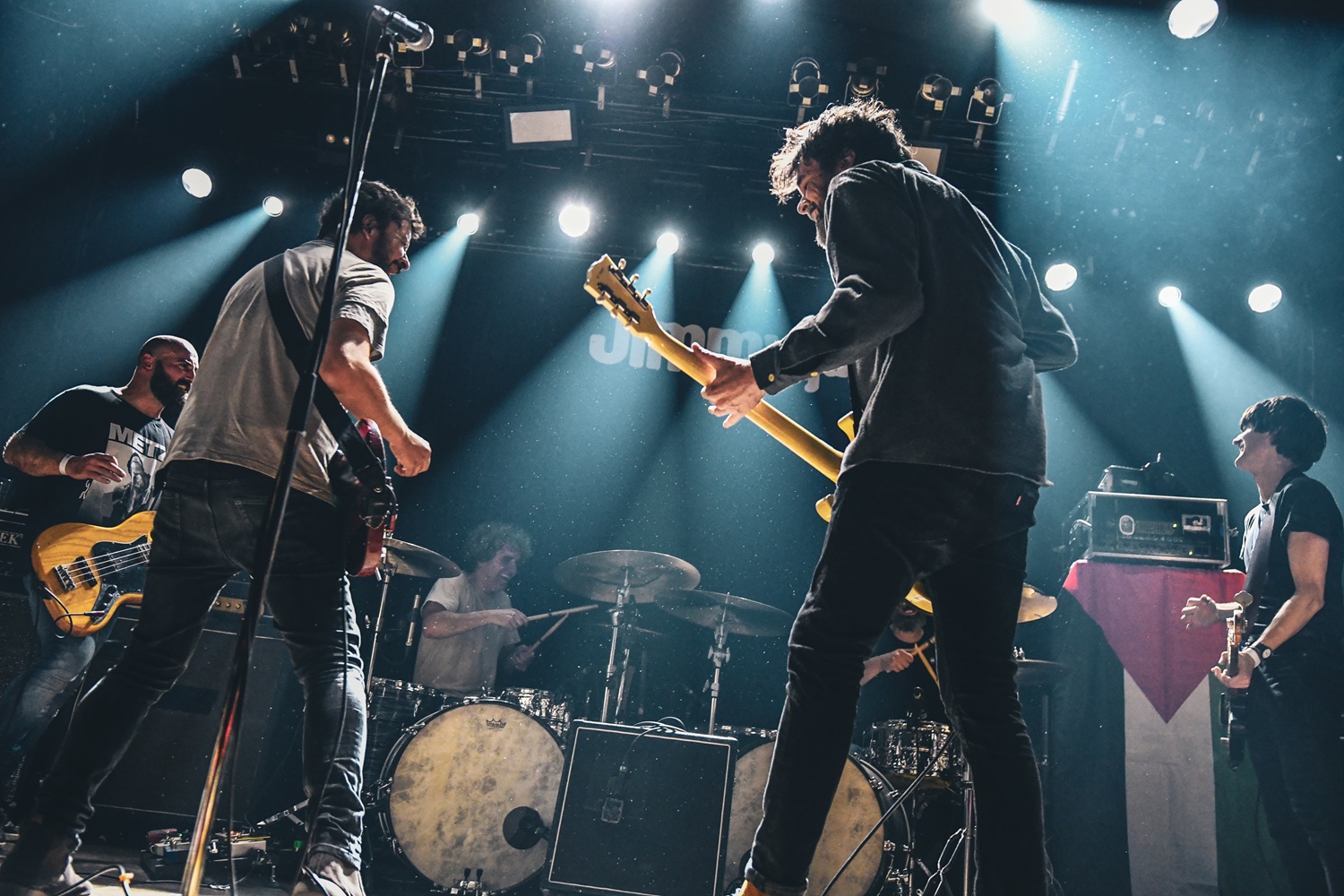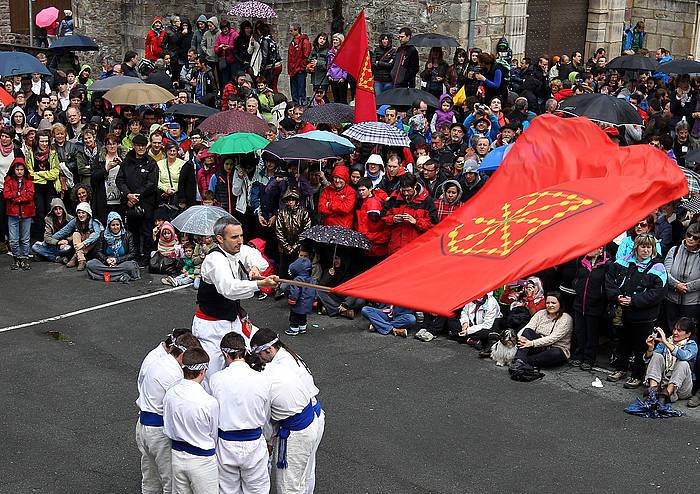"If they call us to play, because they match our speech and not for us to slip."
- For a long time they have delighted their songs in the Osinaga study and the result has come in spring: Arado (Self-production, 2023). The Navarro group Ibil Bedi has its third album, and, as the word plow says, they now come to revolutionize the land, and the culture of these cases, once the two roads have been completed so far. Remove most roots and keep them to create.
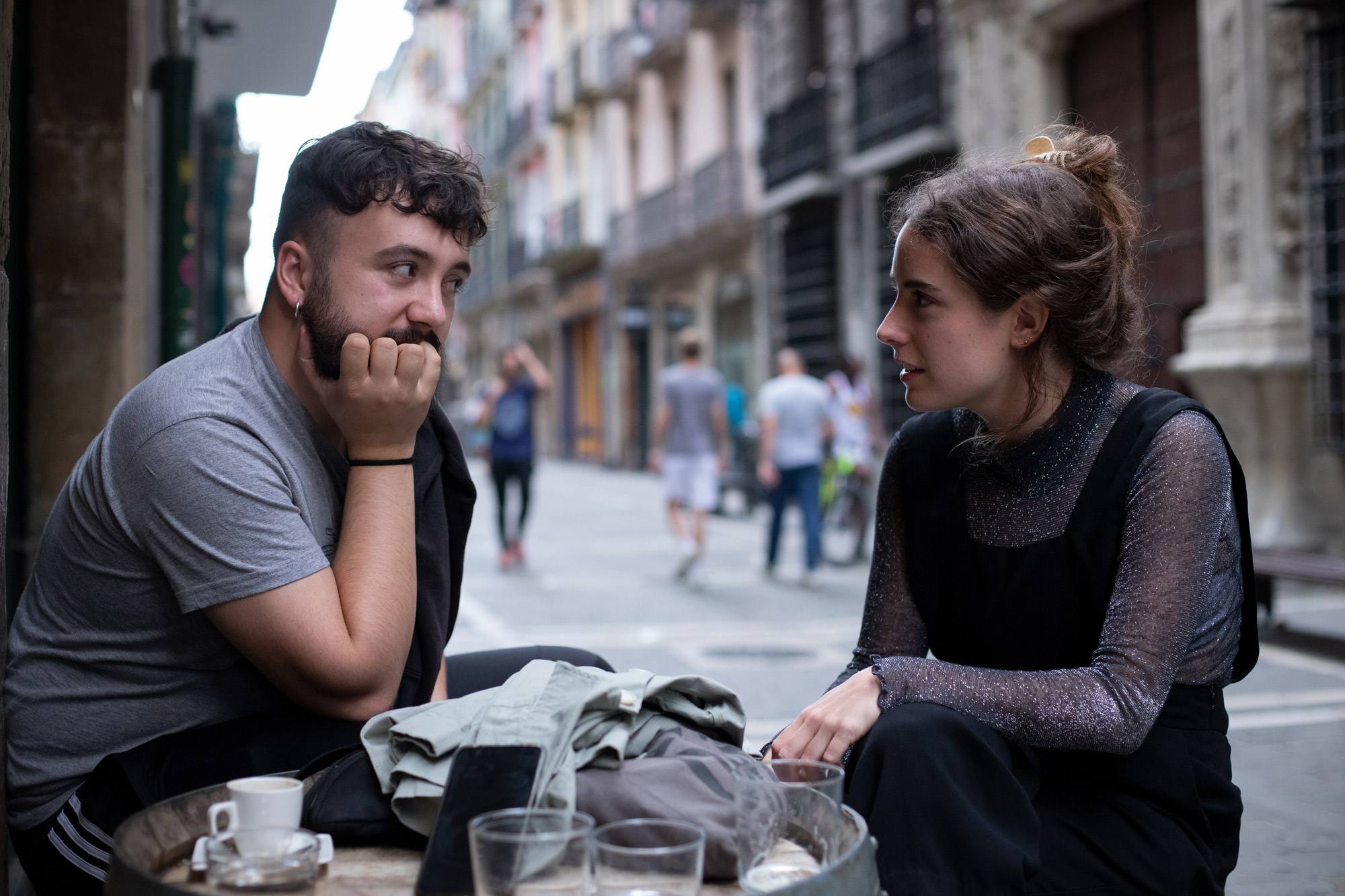
I was talking about Amets, that five members make up Ibil Bedi, that you are not the only representatives of the group, and that obviously someone has to face it, but you do not like it. Why?
Amets Aranguren: I have noticed some comments I have received from outside, and the truth is that... I don't know if it's terror, but it creates a point of rejection for me. Well, it is Ibil Bedi, but in my case I have just worked in the Council of Euskalgintza and it has touched my face. I've never liked a profile of people that appears everywhere, and I've always been very afraid to approach it.
Is it the fear of staging?
A. Aranguren: It gives me respect. I don't want to approach being a public character, I think it's very dangerous. In this country there is a great tendency to mystify people: when in a given place and at a given moment a person with a given profile says something interesting, it seems that that person has to be in every place and you have to give voice to everything. I would not like to approach that. Besides, I am not a fan of videos and photos. I think we in the group have not talked about the dimension that Ibil Bedi has taken...
Ibai Osinaga: We have not spoken, no. But I believe, as in all groups, that the group has an external image, and people see Ibil Bedi very attached to certain people. We, as in this case, have been touched by giving most of the interviews, and we have been “the face”. With this album, however, it has changed a little, there have been more conversations with other colleagues. We have tried, or perhaps it has gone unconsciously.
A. Aranguren: I have done so very consciously, especially because one feeds the other: in some conversations we leave and it seems that we are the group, and that influences internally. The other members do not have to say less than we do, they will also tell other things that may be more interesting.

It speaks of fear of being a public character, of rejection... Does the fact of being a woman influence?
A. Aranguren: Probably yes. I don't think I live directly or explicitly, but I feel something like this in relation to these kinds of profiles that I've mentioned. I'm from Pamplona, girl, young, translated into Basque... Sometimes I've felt like a wildcard.
I. Osinaga: Have you also had that feeling of Ibili Bedin? I mean, it's always quoted ...
A. Aranguren: The quota?
I. Osinaga: Yes.
A. Aranguren: Not in our group, but in other circumstances, that quota of women, in round tables, music groups, festival posters, etc. These are things that we have deeply rooted in.
Ibai Osinaga: "I understand culture the way I understand tradition, as something in continuous motion."
A profile that has historically been rooted is that of an irresponsible or often irreverent musician. It's comfortable on the board, it can have the positions it wants, etc. Does that fear of some people joining the public square combine to be a man?
A. Aranguren: I like to distinguish what is part of one's own personality and what I can and don't do because I'm a woman. In our case, I am fully aware that I find it more difficult to have a presence on stage, but it is also true that Ibai has spent many years on stage with the Altxatu group. What was common to me was very new. However, the fact that there is another woman in the group helps a lot.
I. Osinaga: We have made adaptations in the design of the exit to the public. The current situation (half circle, another half circle is done by the public) contributes to this. There is no one in the center; before, we stood in front and three behind, and I was the one in front and in the center. I feel that I have taken away weight, and that position also divides responsibilities in a more balanced way.
Is it a conscious decision?
I. Osinaga: Yes, absolutely.
And why?
A. Aranguren: We all agreed to change, it was not that we asked Ibai to withdraw him from the foreground. I think it is also nice that we all see each other.
I. Osinaga: The number of musicians does not make it much easier, it is not easy to locate five people aesthetically.
Evolution has not only taken the form of staging, but also in voices. On the first album, Ibai sang in its entirety, and gradually he has been walking towards Amets, until reaching a kind of equalization.
A. Aranguren: It has been something that many people have told us, but behind that there has been no clear decision, so it has emerged.
I. Osinaga: According to the songs, there has been more. On this album I have written fewer songs, fewer letters and Ametsek more.
Does he sing who writes?
I. Osinaga: So far not always.
A. Aranguren: But the person who proposed letters usually proposed a melody along with that letter. And then it's much easier for you to stay with yours and me with mine.
I. Osinaga: Yes, it is. There are two complete songs that we sing together, and in all the others, I sing my lyrics and Dreams.
Therefore, more and more you sing Amets because you have made more proposals. Is it because you found your voice?
A. Aranguren: I wouldn't say it, but I don't know. As I have made more proposals, and in them I sing, I have always adapted them a little to me. I mean, since some songs have been created by me, I've been able to find there where I'm comfortable.
The difference between the two voices is very large: yours is much more powerful, it is stronger, it has much larger volumetric capacity... And mine is fatter. I don't think I'm fatter in myself, but I think that for me to like my voice in singing, it has to be much fatter.
And you, Ibai?
I. Osinaga: I would not say that I “found” a voice. I've had very different records, I've been able to try a lot of things and most of the time I've adapted. But no, I don't have that feeling.
If letters and melodies are proposed, but from that proposal to the result there will be a difference, or what?
A. Aranguren: Of course it changes a lot and it is nice to see the process. The song is clothed together. When you bring the proposal, you've imagined in your head how you want it to be the end, and normally, almost always, it's not that. The song you'd wear is the one you've imagined. But it's not you, it's a group. It is nice to see the track of songs from your proposal.
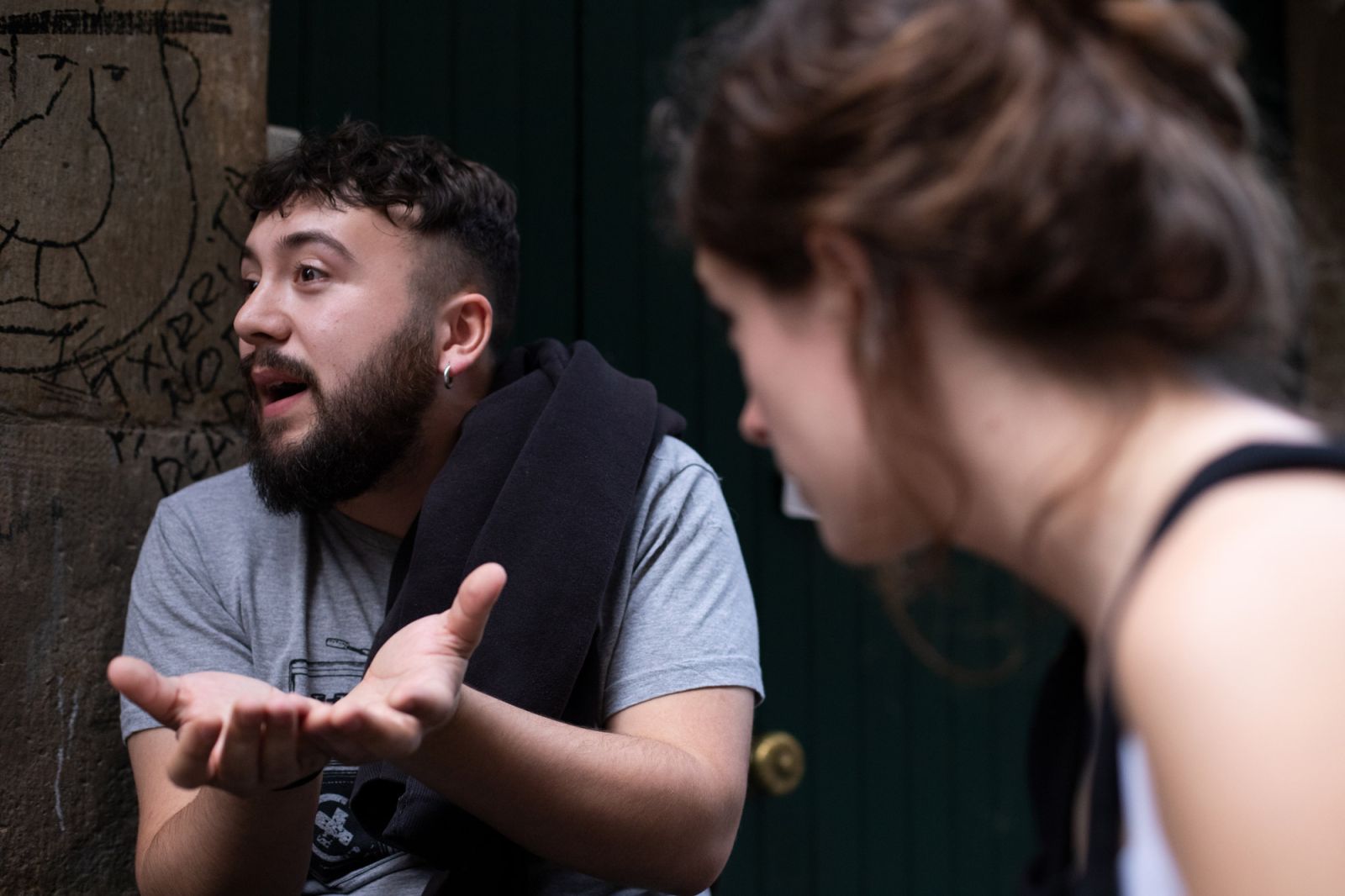
Do you see the musically stabilized group?
I. Osinaga: I see the group stabilized, but not in the narrowest sense, but we are able to do what we think. That is, everyone says what they want to look for in every aspect, and team members are able to understand what it means. That's for me to be stabilized.
A. Aranguren: If we're in a place as a group, but musically I don't believe.
I. Osinaga: Also in the musical field: teamwork, going together, tempo... We take the technical.
We are told that there has been an evolution from the previous album, but that the “essence” of Ibil Bedi is maintained. I don't know what it is, but there's something there, just what I was talking about the other day with the Areta group, that there may be many very similar groups, but that distinguishes between them the voices. I mean, my voice is mine and nobody can mimic. I think we don't give it much importance, but that's so big, that people know that we are listening to our voice.
Amets Aranguren: "In this country, there's a lot of tendency to mystify people."
The voices of both are characteristics, different but complementary at the same time. In the Xirarena song, for example, it is evident.
A. Aranguren: Yes, we managed to have two different and complementary voices in that song, each going for it.
I. Osinaga: Maybe they're not the add-ons technically, because we sing in a certain way, but because we've learned to sing together. Any voice can be compatible if you work.
You've called the album a coup. In agriculture, ploughing is an instrument dedicated to turning the land and, transferred to you, in the San Sebastian concert they spoke at least of the reason that they wanted to invest the culture maintaining several roots. Can you go deeper?
A. Aranguren: The point is that Areta is doing a master’s degree, called “culture management” or something. As it appeared in some of his notes, the concept of plough is based on a theory that... What was Ibai?
I. Osinaga: That culture should function as a plough.
A. Aranguren: That is, you have to move the soil, remove the roots that no longer serve, do the cleaning and continue sowing on that same soil. There will be roots that will remain, because they still serve. We call it that because, on the one hand, you have to name it, and on the other, because we believe that that reading exists with the way we understand culture.

And how do you understand it? At least on a personal level.
I. Osinaga: I think from my way of understanding tradition. It's a little bit along the path that Ion Celestino and Broken Brothers have given, a way in which tradition is understood as something in continuous motion. In our case, music.
A. Aranguren: For this, an image of Oteiza, the trainera, is used, which advances but looks back.
I. Osinaga: It can be cyclical, drinking from some roots; it is fixed in the former, but it is not imitated either. If we weren't making music for 15 to 20 years, and it's true, some are doing it. It's not to say that not entirely to that, it's a bit more compromise.
A. Aranguren: What we have I read the other day to Aritz Ibañez, of the dance group, that tradition itself would be something that is happening in a moment and in a context that responds to a situation. It's not a black and white picture. And just as we talked about Celestino, I talked to him the other day, and he said something like this. “All right, we come from a past and we want to build a future, but we live in a present.” I think he is right, that we strive to maintain and preserve a past and to build a future. And present what? We forget and we should look at it. We are always working for survival; it seems that the goal of this people is to bring it to that day when the world ends, to survive, and in the meantime we stand, take and take us.
Amets Aranguren: "The key is what you say or what you do. Saying something and not going into practice there is no use at all"
There is often talk of a new young scene, which has also politically broken the old one, or at least changed it. Political discourse and political alignment are important.
I. Osinaga: We make music and also singing music. The discourse, for one people, only remains there, in what we sing, that is, that this content is only reflected in the letters for some. For me, the behavior of the group in less obvious decisions is more important.
A. Aranguren: For me, what you are is key: what you say or what you do. The two can be, but you're what you do for me. Saying something and not going into practice there is no point at all. Furthermore, I believe that for some it is possible to do the opposite if you have said something, because you are under alleged pressure, or because you are under a need.
I. Osinaga: These issues are discussed among us and the question is that we know how they act inwards, what they do and what they do not, and what they sell out. What the public knows is what it does outside. There's the crumb. We must also make ourselves self-critical: the lack of communication between the groups influences this. We know what people are doing, but we don't talk.
.jpg)
No communication?
A. Aranguren: It is only in the media interviews or in the round tables that we talk about this kind of thing, in the public forums. However, there is no room for these debates to take place in private. If we've been saying to some people for months that we should get together, that there are a lot of different people, and talk to each other, without recording anything and without publishing it anywhere. I'm not going to go with my dogmas: I want to listen to people, let them convince, understand some things... No judgment.
I. Osinaga: These conflicts emerge when something big happens at some point...
A. Aranguren: Although the spaces mentioned do not exist, the existing relationships are very good. We have a good relationship with a lot of very different people, and it has touched us a lot of coincidence.
I. Osinaga: Our circuit is small, almost all groups will go through almost the same places.
The circuit will be small, but you will have to slide and decide where to hit and where not.
I. Osinaga: With all the circuit that Last Tour takes, here in Pamplona, we don't feel so much that this is a circuit and ours. I see it, but it's that many groups here are moving towards it. However, its presence may imply that this group does not act in the Aintzina bar of Jarauta Street. There is for me the difference between two circuits: a very underground circuit and a very high circuit. But there's also salsa in the middle, like the txosnas circuit.
A. Aranguren: It seems very different to me to play for someone or to play for someone. When you're on someone's behalf, you're making your own speech about that movement, that collective or that individual, but when you touch someone, it's they who join you. I understand, therefore, that if someone calls us it is because it matches our speech and not because we join them. We go onstage and we offer; I'm not going to join all the people in the audience, but that audience does buy what we offer.
Furthermore, deciding where to go and where not to go is a decision. I do not believe that what we have said on one occasion is not because we do not agree with the local discourse.
I. Osinaga: However, the formula mentioned can be extrapolated to not very large circuits. If you call us from the BBK Live and you go, you're legitimizing what they do.
A. Aranguren: I think it is in your hands what to do with it and, of course, you will have to take some of it. However, there are levels and levels.
I. Osinaga: Our circuits are so small that that speech always works.

Back to the record. Ibai, you recorded in your Goldea studio. The previous one also recorded the Black Swan there. We see improvements from second to third.
I. Osinaga: Improvement is literally money: I bought more micro and we have better material (laughs). I think the change has been in the way we understand the record. The other day we preferred to be “natural” without great confusion, and this has been the opposite, we have given more space to production. There has been the change, which we have spent many hours...
A. Aranguren: You've introduced...
I. Osinaga: Yes, especially (laughs). I think this time there has been a “search”: “We want to get here.” It was earlier “this is what we have.”
Self-production is going to give you that opportunity to give you a thousand and one laps.
I. Osinaga: Self-production is related to the things we mentioned earlier. It's clear to us that we want everything, not just recording the record, but carrying concerts, hiring and managing invoices. We've done it because we can, because we've learned and we want to. This gives us freedom because nobody has told us when to take the record out. Obviously, we also have pressure at the same time.
.jpg)
What tour is the album taking? What opinions have you received?
I. Osinaga: Overall good, very good. I have been told that there are no “concrete fears” or that all songs are quite similar. I think that person means there are no songs that they put on the radio every day and burn.
A. Aranguren: We were afraid, as the previous record was pretty good, that people had mystified a bit, and so we took it out, people would have liked it. So, people have told us that we've made "a great record," but it's hard to know to what extent you've taken the work independently and you've come to that assessment, or you've thought that because it's us and you're ready.
I liked a criticism, made by Xalba Ramírez in ARGIA. He says he doesn't know if he liked this album as much as the previous one. He talks about a jump and doesn't know if that jump has reached the place he would like.
I. Osinaga: “The best songs are to come,” he said in the review of the previous album. And this time he repeats it (laughs). That is the most beautiful thing, which we still have a way to go.
Olatz Salvador
Noiz: martxoaren 15ean.
Non: Deustuko jaietan.
------------------------------------------------
Martxoak beti du deustuarrontzat kolore berezia; urtero ospatzen ditugu jaiak, San Jose egunaren bueltan. Bi asteburu bete festa, eta urtetik urtera Deustuko... [+]
Antifa hardcore
Lee-Kore + Hoben
Autoekoizpena
---------------------------------------------------------
Tamalez ez da ohikoa Arrasaten hardcore kontzertuak egitea, bestelako musika eszenak nagusitzen direlako. Hala bada, joan den larunbatean herriko gazte batzuen... [+]
Zero. Transhumanismoa ate-joka erdi aro berrian
Aitor Zuberogoitia
Jakin, 2024
-----------------------------------------------------------
Hasieran saiakera filosofiko-soziologikoa espero nuen, baina ez da hori liburu honetan aurkitu dudan bakarra. Izan ere, biografia... [+]
Hunkituta eta ilusioz egin dut Iruñetik Oronozerako bidea. Maite dut Olaia entzutea, baita hizketan ere. Herriko farmaziaren ondoan autoa utzi eta balkoitik agurtu naute hark eta bere zakur Arak. Grabagailua martxan jarri aurretik, bueltaxka egin dugu frontoira eta Arak... [+]
Adolfo Bioy Casares (1914-1999) idazle argentinarrak 1940an idatzitako La invención de Morel (Morelen asmakizuna) eleberria mugarritzat jotzen da gaztelaniaz idatzitako literatura fantastikoaren esparruan. Nobela motza bezain sakona da, aparta bere bakantasunean, batez... [+]
Anton Txekhov, Raymond Carver eta Alice Munroren ipuingintzari buruzko mahai-ingurua egin dute Iker Sancho, Harkaitz Cano eta Isabel Etxeberria idazle eta itzultzaileek, Ignacio Aldecoa zenaren ipuin literarioaren jaialdian, Gasteizen. Beñat Sarasolak gidatuta, autore... [+]
No other land dokumentalaren zuzendari Hamdan Ballal kolono sionistek jipoitu zuten astelehenean bere herrian, beste hainbat palestinarrekin batera, eta Israelgo militarrek eraman zuten atxilo ondoren. Astarte goizean askatu dute.
Bizitza eztia
Verde Prato
Plan B Records, 2024
--------------------------------------------------------------
Ousmane Sembène zinemagile senegaldar ospetsuari galdetu zioten ea bere pelikulak Europan ulertzen ote ziren. Erantzuna, epikoa: “Izan gaitezen... [+]
Ihes plana
Agustín Ferrer Casas
Itzulpena: Miel A. Elustondo
Harriet, 2024
---------------------------------------------------------
1936ko azaroaren 16an Kondor legioko hegazkinek Madrilgo zenbait museori egin zieten eraso. Eta horixe bera da liburu honetara... [+]
Inoren Ero Ni + Lisabö
Noiz: martxoaren 14an.
Non: Gasteizko Jimmy Jazz aretoan.
----------------------------------------------------
Izotz-arriskuaren seinalea autoko pantailatxoan. Urkiola, bere mendilerro eta baso. Kontzertuetara bideko ohiko errituala: Inoren... [+]
Iruñeko Zaldiko Maldiko Elkartean eta Baigorriko Bixentainean aurkeztu da aurtengo Nafarroaren Eguna, egun berean. Ohi bezala, apirileko azken igandearekin bat egingo da festa Baigorrin, eta horrez gain, apirilean hainbat ekitaldi egingo dira eskualdean.









